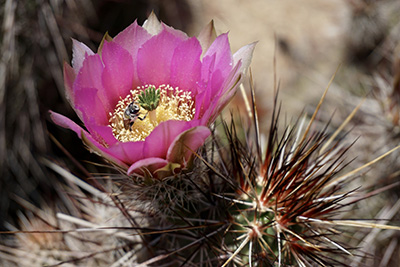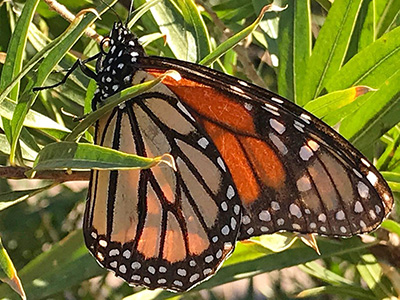Protect our pollinators
Pollinator protection is a national and Scottsdale priority, and numerous organizations actively engage in the effort.
Bees
Bees tend to get a bad reputation. Painful stings, allergic reactions and damage caused by nesting activities come to mind, but most bees are beneficial pollinators and play a critical role in our ecosystem.
Scottsdale and the Sonoran Desert region are home to more than 1,000 bee species. There are many kinds of bees and bee look-alikes, some of which belong to other insect orders, such as the hover fly. Most bees and bee look-alikes are beneficial or benign and do not necessitate action. Some can pose risks, including paper wasps and yellowjackets.
Native bees are also valuable crop pollinators, and in many cases provide pollination under inclement weather conditions when honey bees are not active. Native bees also pollinate wild plants and sustain our native ecosystems.
Unfortunately, bees are dying at an alarming rate, but there are a few easy ways you can help. Honey bees need food, water and shelter to survive. Restricting access to suitable nesting sites will encourage them to go elsewhere to live. Moving resources away from buildings will further reduce encounters.

- Do not attempt to seal holes or fill voids if bees are actively moving in and out of it.
- Fill holes ⅛ inch or larger in walls, and structures with voids inside. Use a good quality sealant to fill all cracks or gaps in walls, rooflines and around foundations.
- Promptly repair leaks in outdoor water taps and irrigation systems.
- Educate children to avoid handling bees around or caught in swimming pools.
- Monitor bird baths, pet water bowls and water features. If bees are using these as a water source, sometimes moving them to other locations can be helpful.
- Gather and discard fruit dropped from trees regularly.
- Cover food when eating outdoors, especially sugary, sweet-smelling foods and drinks. Honey bees often enter open soda cans and cause stings in and around your mouth!
- Keep trash receptacles closed and away from building entrances.
NEVER shoot at, throw water, rocks, gasoline or other chemicals, burn or otherwise threaten bee colonies. Pesticide sprays are not recommended on bee swarms or colonies. Accidental or intentional misuse can lead to far more significant problems.
Bee smart! Do not try to remove honey bee colonies yourself. Bees should only be removed by experienced professionals.
The city of Scottsdale recommends humane removal of bees, which does not result in the destruction of the swarm or hive. Be forewarned that most commercial bee removal services that you call will kill the hive. While that might solve your short-term problem, it could create a long-term problem for our ecosystem.
Thank you to our friends at the University of Arizona and Dr. Shaku Nair for this content, used with permission.
Butterflies
Bees are not the only pollinators that need protecting. Butterflies are beneficial to gardens and are important pollinators, helping to ensure fruits, vegetables and flower produce new seeds.
According to the National Wildlife Federation, the population of monarch butterflies has declined by 90 percent over the past 20 years. Monarch butterflies face habitat loss and fragmentation in the United States and Mexico.

Mayors' Monarch Pledge
Keep Scottsdale Beautiful, a community nonprofit committed to enhancing the Image and appearance of Scottsdale, approached the city to request Scottsdale enter into the NWF Mayors' Monarch Pledge. The pledge asks communities to commit to create habitats for the monarch butterfly and pollinators, and to educate citizens on how they can make a difference. Scottsdale City Council voted unanimously to adopt the NWF Mayor’s Monarch Pledge on Jan. 14, 2020.
Scottsdale pledged to:
- issue a proclamation to raise awareness about the decline of the monarch butterfly and the species’ need for habitat,
- plant or maintain a monarch and pollinator-friendly demonstration garden at City Hall or another prominent location and,
- plant milkweed and native nectar plants in medians and public rights-of-way
The city has met all three pledge actions.
Scottsdale Butterfly Gardens
Scottsdale has butterfly gardens at Scottsdale Ranch Park, Granite Reef Senior Center, Rotary Park and Paiute Neighborhood Center. The city's parks maintenance team uses desert milkweed and native nectar plants along many of the rights-of-way and staff will continue to identify more areas for these monarch-friendly plants.